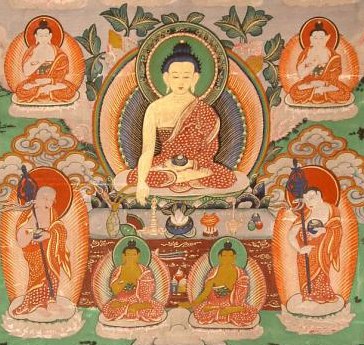Great Throughts Treasury
This site is dedicated to the memory of Dr. Alan William Smolowe who gave birth to the creation of this database.

Majjhima Nikāya
Buddhist Scripture On Nirvana, the second of the five nikayas, or collections, in the Sutta Pitaka, which is one of the "three baskets" that compose the Pali Tipitaka of Theravada Buddhism
"The purpose of the Holy Life does not consist in acquiring alms [or] honor... nor in gaining morality [or] concentration... That unshakable deliverance of the heart: that indeed, is the object of the Holy Life, that is its essence, that is its goal."
"Find a place where you are alone. Train yourself in the following way: When you breathe in, experience breathing in. When you breathe out, be fully conscious that you are breathing out. If you cherish and practice this, it will bear great fruit. Whatever you are doing and wherever you are, you will find steadiness, calm, and concentration if you become conscious of your breathing."
"The past should not be followed after,and the future not desired; what is past is dead and gone, and the future is yet to come."
"Where, for instance, is the identity of myself? There's a special quality that makes me different from everything else and also from all other selves. And I want that identity, my own self, to continue. So where does that identity dwell?" "Where indeed?" asked the Buddha. "That self to which you cling is in constant change. Years ago you were a baby, then a youth, and now a man. Which is your true self—that of yesterday, that of today, or that of tomorrow which you so long to preserve?" "I see I have misunderstood things," replied Kutadanta slowly, "and although I find it hard to endure the light, the truth now dawns on me that there is no separate and enduring self. I will take my refuge in your teaching and find that which is continuing and everlasting in the truth."
"If you want to know the past, to know what has caused you, look at yourself in the PRESENT, for that is the past's effect. If you want to know your future, then look at yourself in the PRESENT, for that is the cause of the future."
"You tell me to stand still, but I am not walking," he shouted, "whereas you who are walking say you are still. How is it that you are standing still but I am not?" The Buddha turned round. "My legs move but my mind is still," he said."Your legs are still but your mind moves all the time in a fire of anger, hatred, and feverish desire. Therefore, I am still but you are not."
"And what is grasping? There are four: grasping for sense pleasures, for speculative views, for rites and customs, and for delusions of selfhood."
"When you contemplate the body by being within the body, you should not engage in all sorts of ideas about it; the same when you contemplate feelings by being within feelings, you should enter in without ideas; the same applies to contemplating the mind by being within the mind and contemplating thoughts by being within thoughts. The thoughts should be just the objects of mind and you should not apply yourself to any train of ideas connected with them. In this way, by putting ideas aside, your mind will become tranquil and fixed on one point. It will then enter into a meditation that is without discursive thought and is rapturous and joyful."